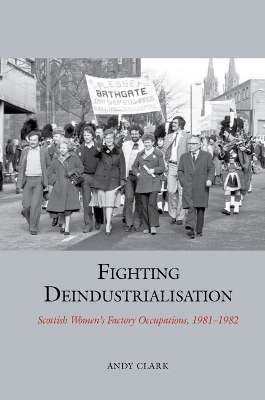
Fighting Deindustrialisation
Liverpool University Press (Verlag)
978-1-80207-711-7 (ISBN)
In Fighting Deindustrialisation, Andy Clark outlines and examines one of the most significant and under-researched periods in modern Scottish labour history. Over a fourteen month period in 1981 and 1982, as Scotland suffered the effects of the accelerated deindustrialisation of its economy, three workforces refused to accept the loss of their jobs. The predominantly women assembly workers at Lee Jeans (Greenock), Lovable Bra (Cumbernauld), and Plessey Capacitors (Bathgate) were informed that their multinational employers had taken the decisions to close their plants. At each site, a battle was fought against capital movement, corporate greed, and unfair jobloss. The workers occupied their factories and refused to vacate until their demands were met and closure avoided. At all sites this objective was achieved; none of the factories completely closed following the women’s occupations.
In this book, these occupations are analysed together for the first time, through a range of analytical frameworks from oral history, memory studies, industrial relations scholarship, and deindustrialisation studies. In his extensive examination, Clark argues that the actions of 1981-82 should be considered as one of the most significant periods in Scotland’s history of deindustrialisation. However, the public memory of 1981-82 is precarious; Fighting Deindustrialisation begins the process of incorporating women’s militant resistance within academic and popular understandings of working-class activism in later 20th century-Scotland.
Andy Clark is a Research Associate in oral history with the Newcastle Oral History Collective, Newcastle University.
Acknowledgements
Introduction: ‘Not our jobs to sell’
Chapter 1: ‘No way could ye get another job’: The development of deindustrialisation studies
Chapter 2: ‘Why the hell are ye takin’ the job aff me?’ Theorising Collective Action
Chapter 3: ‘Ah mean, the young anes don’t know wit a factory is’: Scotland’s economy and women’s working lives in the twentieth-century
Chapter 4: ‘Wait a minute, wit have we actually just said here?’ The Lee Jeans Occupation
Chapter 5: ‘We were frightened it wis aw’ gonnae go abroad and we’d be oot the factory’: The Lovable Occupation
Chapter 6: ‘We felt like criminals! And we wurnae, we were just fightin’ for wur job’: The Plessey Capacitors Occupation
Chapter 7: ‘It wisnae as if we’re sittin’ there wi’ nae work’: Injustice, solidarity, and the mobilisation of the workers
Chapter 8: ‘There is nothing there for us and nothing for the future. We are going to battle – we are not moving’: Deindustrial Contexts
Chapter 9: ‘Ye never think that somebody’s gonnae come along and ask ye questions aboot it’: The turn to memory
Conclusion: ‘Ah’m part ae that wee bit of history’
Appendix A: Interviewee Details
Bibliography
| Erscheinungsdatum | 17.10.2022 |
|---|---|
| Reihe/Serie | Studies in Labour History ; 19 |
| Zusatzinfo | 13 Illustrations, black and white |
| Verlagsort | Liverpool |
| Sprache | englisch |
| Maße | 163 x 239 mm |
| Themenwelt | Geschichte ► Teilgebiete der Geschichte ► Wirtschaftsgeschichte |
| ISBN-10 | 1-80207-711-1 / 1802077111 |
| ISBN-13 | 978-1-80207-711-7 / 9781802077117 |
| Zustand | Neuware |
| Haben Sie eine Frage zum Produkt? |
aus dem Bereich


